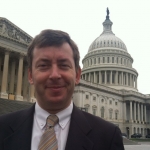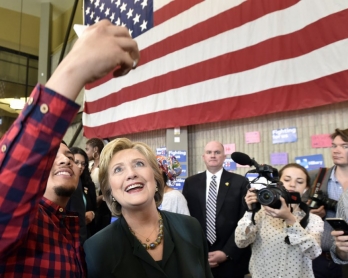Hillary and the 'snakes' on her plane
New York City -- As we prepared to take off for our first trip aboard Hillary Clinton's newly unveiled campaign jet -- the words "Stronger Together" emblazoned on the fuselage -- the atmosphere was congenial.
The press corps had spent more than a year trailing the Democratic presidential candidate around the country with about as much access to her as the general public.
Now, with a smiling Clinton walking down the aisle to chat with reporters, we were finally getting a closer look.
"I am so happy to have all of you with me. I was just, waiting for this moment," she said with an exaggerated flourish as we stretched our recorders towards her.
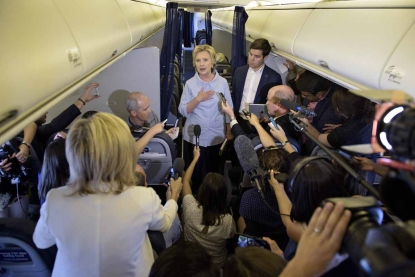 Chatting with the press aboard her plane, September, 2016. (AFP / Brendan Smialowski)
Chatting with the press aboard her plane, September, 2016. (AFP / Brendan Smialowski)The former secretary of state was seeking to dispel the increasingly hardened view that Clinton, perhaps the most scrutinized and skewered American to run for president in the modern era, was keeping the press at arm's length as she struggled to maintain her lead over her Republican rival, the real estate magnate Donald Trump.
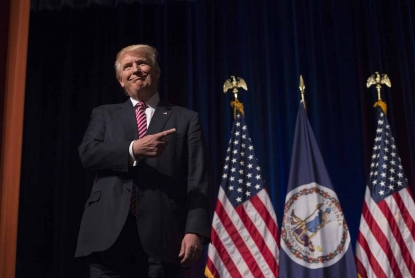 Donald Trump at a campaign event in Virginia, August 2, 2016.
(AFP / Molly Riley)
Donald Trump at a campaign event in Virginia, August 2, 2016.
(AFP / Molly Riley)We collectively wondered whether we'd feel relief at finally traveling with her, anxiety about whether it would meet our expectations, or frustration at the continued lack of access.
All of the above, it turned out.
The US media was suddenly convenient for her. But a week later? Not so much. The congeniality turned out to be short-lived.
The news wires, television networks and major newspapers who comprise the text and video pools that follow presidential hopefuls are adamant about keeping the candidates within eyesight at all events.
Usually such coverage feels mundane to reporters, as they follow the candidate through his or her routine. But Clinton's has been fraught with press-related hiccups.
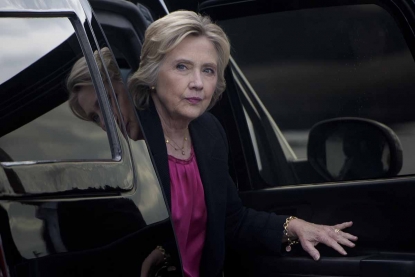 Getting ready to board her plane in Tampa, Florida, September, 2016.
(AFP / Brendan Smialowski)
Getting ready to board her plane in Tampa, Florida, September, 2016.
(AFP / Brendan Smialowski)In July 2015 her team corralled reporters using a thin white rope as she walked in a parade, a perfect metaphor for how it treats media.
One could argue there is reason for the paranoia.
Clinton has been in the public eye for a third of a century. Reporters relentlessly and rightly pursued the swirling controversies that dogged Bill and Hillary during his years as governor of Arkansas. The controversies and the press scrutiny followed them into the White House.
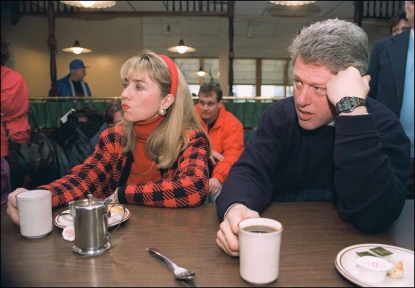 Bill and Hillary Clinton relax while campaigning in February, 1992.
(AFP / John Mottern)
Bill and Hillary Clinton relax while campaigning in February, 1992.
(AFP / John Mottern)But while Bill Clinton was known for playing cards with journalists on his campaign plane as he ran for president in 1992, Hillary -- in the era of social media, phone cameras and 24-hour news appetites -- has been far more guarded.
On September 11, her campaign froze out the press pool altogether, exactly when it mattered.
As reporters watched the ceremony in New York City to mark the 2001 attacks, it suddenly became clear that Clinton was no longer there.
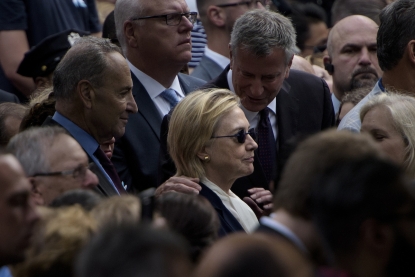 New York City Mayor Bill de Blasio speaks to Hillary Clinton at the 9/11 memorial ceremony before she left the event feeling unwell.
(AFP / Brendan Smialowski)
New York City Mayor Bill de Blasio speaks to Hillary Clinton at the 9/11 memorial ceremony before she left the event feeling unwell.
(AFP / Brendan Smialowski)Reporters began a hectic search. Where did she go, we asked one another. We tried calling a spokesman. Nothing. A campaign aide. Radio silence.
We were completely in the dark about her whereabouts. Had she gone home? Did she duck out for a private meeting? Was she rushed to hospital?
"Campaign has not confirmed Clinton's status or whereabouts, stand by for more information," a pool reporter wrote at 9:49 am, nearly 20 minutes after Clinton departed the scene.
We repeatedly asked if she had left and what was happening. No reply.
Finally, 98 minutes after the Democratic nominee for the world's most powerful job went AWOL, Clinton's campaign released a statement.
"During the ceremony, she felt overheated so departed to go to her daughter's apartment, and is feeling much better."
Clinton emerged from Chelsea's Manhattan flat -- by this time the pool had been conveniently reassembled -- and walked in front of the cameras to pronounce: "I'm feeling great."
Hours later came the revelation that Clinton had been examined by a doctor and diagnosed with pneumonia -- two days earlier -- and that she was trading West Coast fundraisers for bed rest.
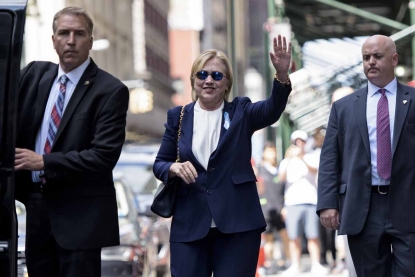 Waving to the press after leaving her daughter's apartment in New York City. September 11, 2016.
(AFP / Brendan Smialowski)
Waving to the press after leaving her daughter's apartment in New York City. September 11, 2016.
(AFP / Brendan Smialowski)Wait. Two days earlier? The presidential frontrunner kept her illness a secret for 48 hours?
Trump pounced. "She always treats you all like second-class citizens," Trump's campaign manager Kellyanne Conway told CNN, mocking Clinton for holding occasional availabilities and then keeping us out of the loop when it mattered.
Observers fumed about her lack of transparency. "This was a disaster over the weekend," added Larry Sabato of the University of Virginia's Center for Politics. "It was stupid."
The candidate herself went into damage control acknowledging she should have been more transparent instead of keeping her ailment to herself and trying to "power through."
For journalists, being on the campaign planes provides us with more opportunities to interact with the candidates and get a feeling for their operations.
As we accompanied Clinton on that first trip on her plane a few weeks ago in the home stretch of the 2016 White House race, I and three dozen other reporters peered out the window as we touched down in Cleveland, Ohio and saw something unexpected: Trump’s plane parked on the tarmac.
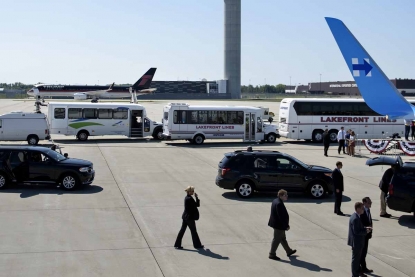 Trump's plan on the tarmac in Cleveland, Ohio, September 5, 2016.
(AFP / Brendan Smialowski)
Trump's plan on the tarmac in Cleveland, Ohio, September 5, 2016.
(AFP / Brendan Smialowski)We collectively gawked, shook our heads and snapped photographs as we taxied to within just 200 meters of his private jet. This was awkward.
But Ohio is perhaps the quintessential battleground state of the 2016 race, and the candidates are circling each other like hawks.
The following morning, Clinton came back to chat with reporters.
How did you feel stepping out of your jet and coming face to face with Trump's plane, I asked her.
"I didn't feel anything," she insisted through a smile. "Was I supposed to?"
She then endured a 20-minute onboard grilling by reporters, as she had the previous day.
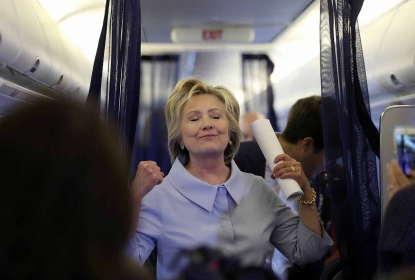 Praying for a better audience? Clinton chats with reporters on her plane in White Plains, New York, September, 2016.
(AFP / Justin Sullivan)
Praying for a better audience? Clinton chats with reporters on her plane in White Plains, New York, September, 2016.
(AFP / Justin Sullivan)Questions rapidly turned to why her aides used expensive software to delete her private emails while she was secretary of state, to allegations of impropriety surrounding her family's Clinton Foundation, and to polls that show a resilient Trump cutting into her lead.
Clinton endures such grillings regularly. Nevertheless, some Americans -- particularly conservatives -- are convinced the press is in Clinton's pocket, refusing to challenge her on tough issues.
After I posted a photograph of reporters awaiting their first opportunity to question Clinton on her Boeing 737, Twitter lit up with jeers.
"Snakes on a plane," wrote several users. "Presstitutes," sneered another.
At the end of Day 2 onboard with Clinton, the press pack sought to have some calculated fun.
A reporter rolled an orange up the aisle towards the Clinton cabin with a question written on it: Who would you have dinner with, Trump or Russia's Vladimir Putin?
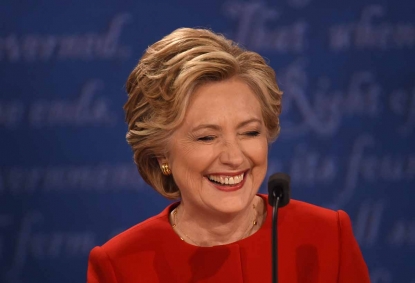 (AFP / Timothy A. Clary)
(AFP / Timothy A. Clary)"Orange bowling" has become a tradition in US presidential campaigns, with the expectation that the candidate writes a response on the citrus and rolls it back.
Does the ritual reflect the difficulties that reporters like me have in securing information from the always-on-guard candidates? Or does it only serve to highlight a lap-dog media desperate to connect with the person they cover?
Republican Mitt Romney participated in the bowling in 2012, and Clinton reportedly did in 2008, during her first presidential bid.
But this time, the orange diplomacy was a dud.
I saw the fruit roll back our way at the hand of a campaign aide, with Putin's name circled. A debate about whether the entire incident was on or off the record ensued, leading to several tense minutes aboard Clinton's new ride.
"I circled Putin," the aide said, ending the matter.
Clinton had nothing to do with it.
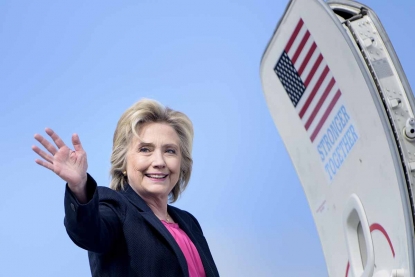 (AFP / Brendan Smialowski)
(AFP / Brendan Smialowski)


